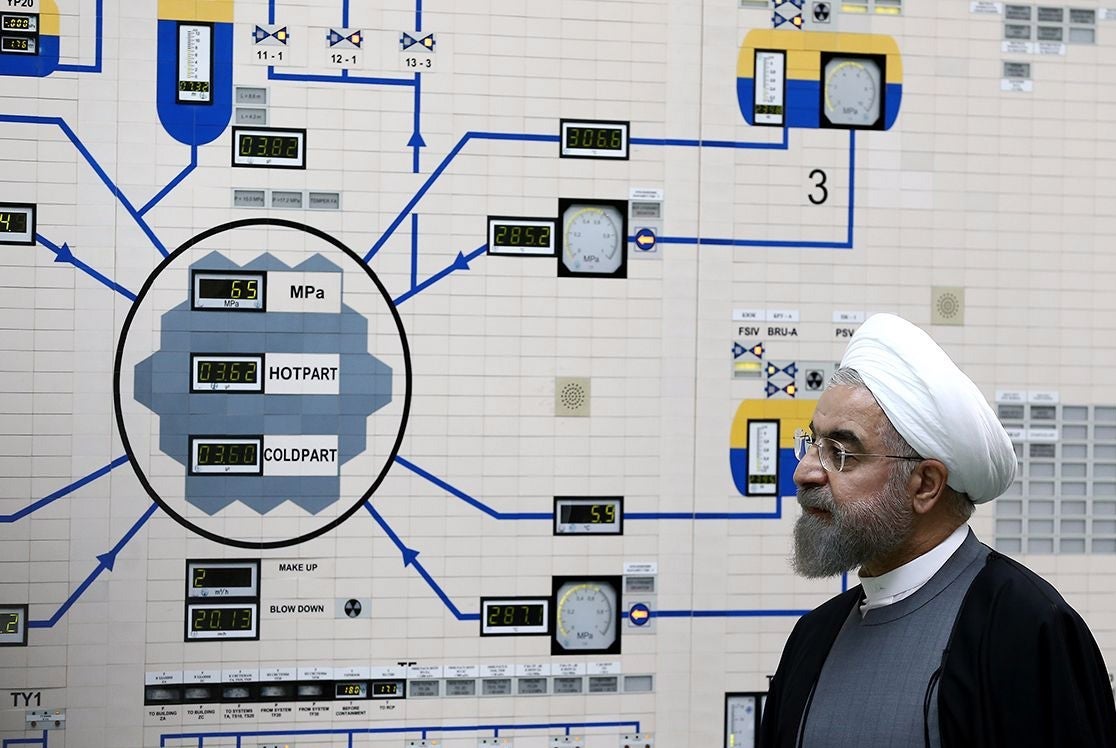Iran and France working on plan to salvage nuclear deal, Macron says
French and Iranian presidents want to find ‘conditions for talks’ between Tehran and world powers
Your support helps us to tell the story
From reproductive rights to climate change to Big Tech, The Independent is on the ground when the story is developing. Whether it's investigating the financials of Elon Musk's pro-Trump PAC or producing our latest documentary, 'The A Word', which shines a light on the American women fighting for reproductive rights, we know how important it is to parse out the facts from the messaging.
At such a critical moment in US history, we need reporters on the ground. Your donation allows us to keep sending journalists to speak to both sides of the story.
The Independent is trusted by Americans across the entire political spectrum. And unlike many other quality news outlets, we choose not to lock Americans out of our reporting and analysis with paywalls. We believe quality journalism should be available to everyone, paid for by those who can afford it.
Your support makes all the difference.France and Iran have agreed to work together to find conditions for resuming international talks aimed at saving the 2015 nuclear deal, French president Emmanuel Macron has said.
Mr Macron said he spoke for more than an hour with Iranian president Hassan Rouhani on Saturday, and said they are trying to find a way to resume dialogue between world powers and Iran.
It comes as Iranian officials get set to announce an increase in uranium enrichment to 5 per cent – an amount above the limit set by the landmark agreement.
“The main announcement [on Sunday] will be the increase of the level of enrichment to 5 per cent percent from 3.67 per cent that we agreed under the deal,” an Iranian official told Reuters on condition of anonymity.
The violation happens at a time of heightened US-Iranian confrontation, a year after Donald Trump pulled the US out the pact and reintroduced sanctions lifted under the accord.
“The President of the Republic has agreed with his Iranian counterpart to explore by July 15 conditions to resume dialogue between the parties,” Mr Macron’s office said in a statement.
His office added that he would keep on talking with Iranian authorities and other involved parties to “engage in a de-escalation of tensions related to Iranian nuclear issue”.
Tehran’s planned announcement is, however, a major setback for France, Britain and Germany, co-signatories of the deal who have pressed for months to persuade Iran to remain committed to the accord.

Tehran said that the Europeans have done “too little, too late” to salvage the pact by protecting Iran’s economic interests from US sanctions.
“The US sanctions are a full-scale economic war against Iran that could create more crisis in the region and in the world,” Mr Rouhani told Mr Macron, according to Iranian state TV.
“This would be a very worrisome step that could substantially shorten the time Iran would need to produce the material needed for nuclear weapons,” said Miles Pomper, a senior fellow at the Middlebury Institute of International Studies’ James Marin Center for Nonproliferation Studies.
“Both Iran and the Trump administration should be looking for ways to de-escalate the crisis, rather than exacerbate it.”
Iran’s main demand – in talks with the European parties to the deal and as a precondition to any talks with the United States – is to be allowed to sell its oil at the levels before Washington pulled out of the deal and restored sanctions.
Iranian crude exports were around 300,000 barrels per day or less in late June, industry sources said, a fraction of the more than 2.5 million barrels per day Iran shipped in April 2018, the month before Mr Trump withdrew from the nuclear deal.
Additional reporting by agencies

Join our commenting forum
Join thought-provoking conversations, follow other Independent readers and see their replies
Comments